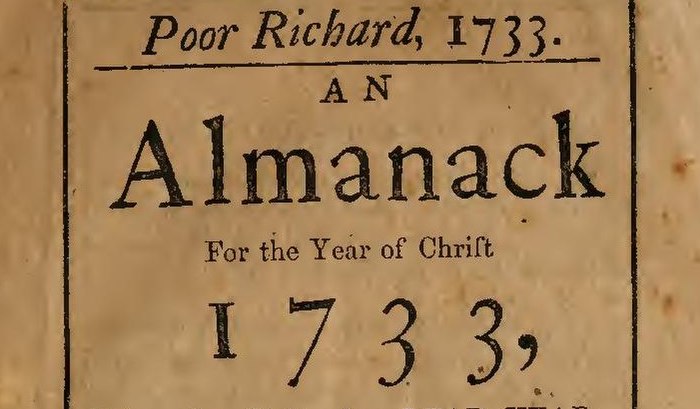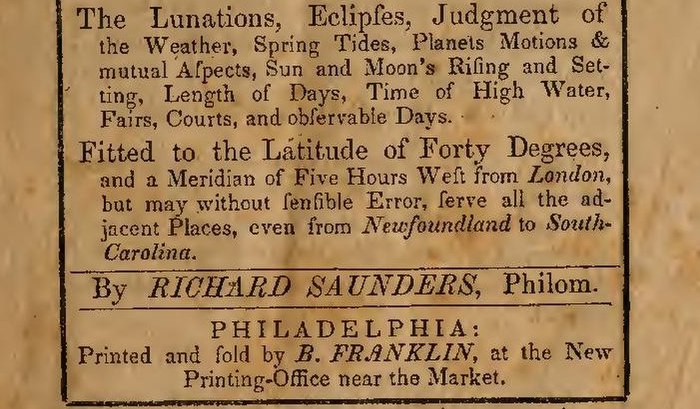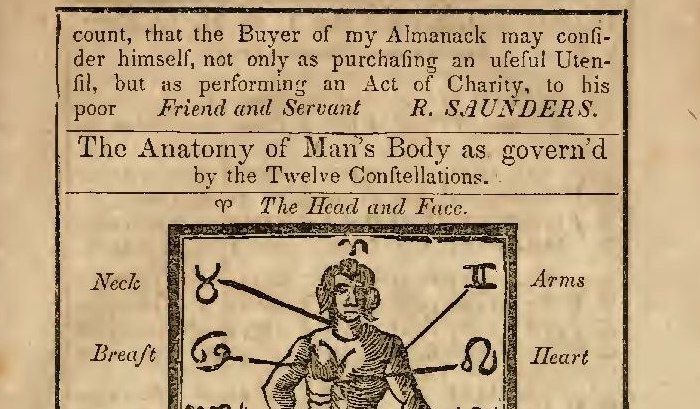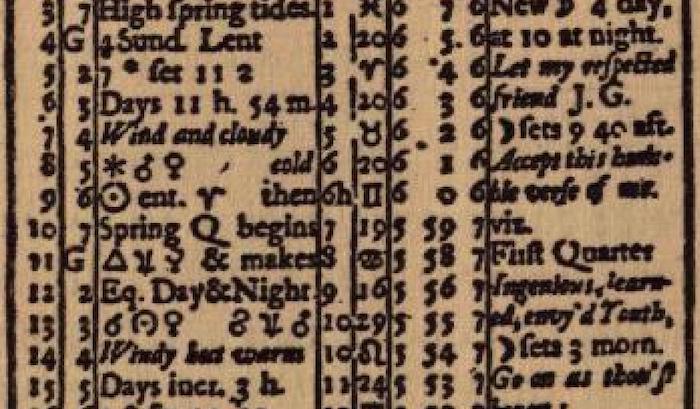In 1730, future American founding father Ben Franklin published his first almanac. While Poor Richard’s Almanack is famous today, Franklin had to do something to stand out in a crowded market. So he used a gimmick: he predicted the death of the author of a rival almanac, then kept the gag going for years, absolutely infuriating his competitor. It’s funnier than it sounds and surprisingly gameable!
(Because the subject of this post, while true, is very silly, I felt it appropriate to release it on the Tuesday closest to April Fool’s Day.)
This post is brought to you by beloved Patreon backer Arthur Brown. Thanks for helping keep the lights on! If you want to help keep this blog going alongside Arthur, head over to the Patreon page – and thank you!

When Franklin published his first almanac, he was entering a well-established industry. Almanacs as a literary form were centuries old – millennia, depending on your definitions. Readers in British America had lots of different almanac publishers to choose from. Generally, an almanac from the era included a calendar, the dates of important astronomical events (including the highest tides), astrological predictions of major weather events, a few tables of facts and figures, and some entertaining writing. Of these, the monthly calendars were the most important. If you wanted to look up what day of the week a particular date would fall on, you probably did it in your almanac for the year. Among other facts and figures, Franklin’s first almanac included the dates the courts would be in session in 1733 and a list of the Kings of England from Ecgberht of Wessex to George II.
To stand out in a crowded field, Franklin did two things. First, he made his almanac funny. He wrote not as himself but as Richard Saunders, the name taken from an almanac writer a hundred years prior. Franklin’s ‘Richard Saunders’ was self-deprecating, whinging, and delivered absurd astrological predictions with deadpan seriousness. It was delightful satire targeting almanac-writers. Franklin stuffed his almanac with witty observations, quips, and wise sayings. Admittedly, the quality of his sayings declined over time as they became more serious, but the first edition was full of sayings like “He’s the best physician that knows the worthlessness of the most medicines” and “Never mind it; she’ll be sober after the holidays.”
The second thing Franklin did was predict the death of his chief rival, the Philadelphian almanac-writer and astrologer Titan Leeds. In the introduction to the 1733 edition, Poor Richard writes:
“[I would have published] an almanac many years since, had [I] not been overpowered by my regard for my good friend and fellow student, Mr. Titan Leeds, whose interest I was extremely unwilling to hurt. [Yet] inexorable death, who was never known to respect merit, has already prepared the mortal dart. The fatal sister has already extended her destroying shears, and that ingenious man must soon be taken from us. He dies, by my calculation made at his request, on Oct. 17, 1733, 3:29 pm… By his own calculation he will survive till the 26th of the same month. This small difference between us we have disputed whenever we have met these nine years past; but at length he is inclinable to agree with my judgment.”
(I’ve trimmed the excerpt and modernized the spelling and punctuation.)

Obviously, this publicity stunt was a hoax. Richard Saunders, being fictional, was not a good friend of Titan Leeds, nor had the more-established almanac-writer predicted his own death. Leeds seemed to take the prediction as an insult. He probably didn’t appreciate the pointed satire about the uselessness of astrology either. (Or he saw a public feud as free publicity.) In next year’s Almanac, Leeds complained about Poor Richard. Franklin had Richard respond as though he were hurt that his good friend would say such mean things about him, and that the slander coming from Leeds was proof that Leeds really was dead:
“There is however, (and I cannot speak it without sorrow) the strongest probability that my dear friend is no more. For there appears in his name … an almanac for the year 1734, in which I am treated in a very gross and unhandsome manner; in which I am called a false predictor, ignorant, a conceited scribbler, a fool, and a liar. Mr. Leeds was too well bred to use any man so indecently and so scurrilously, and moreover his affection for me was extraordinary. So that it is to be feared that pamphlet may be only a contrivance of somebody or other, who hopes perhaps to sell two or three years’ almanacs still, by the sole force and virtue of Mr. Leeds’s name”
Ben Franklin kept up the gag in 1735:
“I say, having received much abuse from the ghost of Titan Leeds, who pretends to be still living, and to write almanacs in spite of me and my predictions, I cannot help saying, that though I take it patiently, I take it very unkindly.”
And in 1736:
“These ill-willers of mine, [despising] the great reputation I gained by exactly predicting another man’s death, have endeavored to deprive me of it all at once in the most effectual manner, by reporting that I myself was never alive. They say in short, that there is no such a man as I am, and have spread this notion so thoroughly in the country that I have been frequently told it to my face by those that don’t know me.”

Leeds finally died for real in 1738. He left behind a stack of astrological calculations for seven future years. His publishers, William and Andrew Bradford, announced his death in the 1739 edition of Titan’s New Almanack while also announcing they’d continue to publish for seven years more using Titan’s last calculations. In the 1740 edition of his Poor Richard’s Almanack, Franklin (as Richard) claimed to have been visited by the spirit of Titan Leeds. The ghost possessed Richard’s body while he was asleep and wrote out a letter in his own hand. The letter insisted that Titan had been dead this whole time and repudiated any further printings of his almanac. To prove that this really was a ghost letter and not a hoax, Titan closed his letter with three predictions, all of them insulting other almanac-writers:
“About the middle of June next, [John Jerman, author of American Almanack], shall be openly reconciled to the Church of Rome, and give all his goods and chattels to the chapel, being perverted by a certain country schoolmaster. On the 7th of September following my old friend [William Birkett, author of Poor Will’s Almanack] shall be sober nine hours, to the astonishment of all his neighbors. And about the same time [William and Andrew Bradford] will publish another almanac in my name, in spite of truth and common sense.”

John Jerman, who was accused of an imminent conversion to Catholicism (a faith much despised in British America outside Quebec), could no more take a joke than Titan Leeds could. He published in his 1741 almanac:
“And as for the false prophesy concerning me, that Poor Richard put in his almanac the last year, I do hereby declare and protest that it is altogether false and untrue, which is evidently known to all that know me, and plainly shows that he is one of Baal’s false prophets.”
This baited Franklin, who wrote in the 1741 Poor Richard:
“This false, false prophecy he speaks of, related to his reconciliation with the Church of Rome, which, notwithstanding his declaring and protesting, is, I fear, too true. Two things in his elegiac Verses confirm me in this suspicion. He calls the first of November by the name of All Hallows Day. Reader, does not this smell of Popery? Does it in the least savor of the pure language of [Quakers]? But the plainest thing is his adoration of saints, which he confesses to be his practice, in these words, page 4”
‘When any trouble did me befall,
To my dear Mary then I would call’
Did he think the whole world were so stupid as not to take notice of this? So ignorant as not to know, that all Catholics pay the highest regard to the Virgin Mary? Ah! friend John, We must allow you to be a poet, but you are certainly no Protestant. I could heartily wish your religion were as good as your verses.”
Franklin and Jerman continued on in this way for some years. One imagines the public feud may have boosted sales for both publishers.

If we take the Titan Leeds thing seriously, we can get a short, funny adventure – the joke persists even when treated literally. That said, your players might enjoy the joke more if you explain the real history behind it.
Setup: The party is approached by Fen Branklin, a noted wit, author, and publisher. One of her most popular works is the annual Poor Dicky’s Almanack. The almanack is convenient, moral, witty, and sometimes funny. People also love the character of Poor Dicky, a self-deprecating man with a wounded attitude who’s just trying to do his best. Tell the players that some of their characters have read one or two editions of the Almanack. Ask them if they enjoyed the Poor Dicky character or if they found its artifice a bit much. Fen Branklin tells the party that she’s got a job for them that will require considerable discretion. She has to have their word that they won’t tell anyone before she’ll fill them in on what it’s about.
Situation: For years, the pages of Poor Dicky’s Almanack have featured Dicky’s public feud with Branklin’s rival almanac-writer Leeds (who is a literal titan). The character of Dicky predicted that Leeds would die six years ago, and the titan Leeds has been complaining about it in her own almanac ever since. Dicky’s responses are hurt and aggrieved in a way that indicates Branklin is winking at the reader: “Can you believe this gal’s still butthurt that a fictional character predicted her death years ago?”
The big secret is that Poor Dicky is real. He’s not a narrative device for Branklin’s almanac. He’s a real astrologer with a good track record of success. Branklin pays him well for writing the Almanack, and Dicky appreciates being kept out of the limelight.
All that business about predicting the death of the titan Leeds wasn’t just a promotional stunt. According to Poor Dicky’s calculations, Leeds really should have died seven years ago. And Dicky really is upset – not just that his calculations were wrong, but also that Leeds keeps saying mean things about him in her own almanac.
Fen Branklin would really appreciate it the party would look into the big mystery of why Leeds isn’t dead. While the PCs are at it, could they get the titan to lay off Poor Dicky?
Leeds, being a titan, doesn’t live in town. People have met her and spoken to her, so she’s not fictional, but she lives somewhere out in the wilds, as do most of her people. The best starting point is her publishers, the grasping brothers William and Andrew Bradford. They will happily agree to deliver a letter. “But if it’s about not predicting that eclipse last year,” they add, “forget about it. Leeds already knows and doesn’t need to hear it again.” If pressed for an actual location, they grow evasive. Handing over a letter and then following the messenger is one way to find Leeds. So is bribing or threatening the publishers. So too is divination magic – though you might declare that her magical nature makes her hard to scry. There’s a diviner in town who can do it, but she’ll need a favor first. She doesn’t approve of her daughter’s new boyfriend. If the party scares the guy off, the diviner will find Leeds for them.
If the party ever tells someone why they need the titan Leeds, that person will not help them. The idea is ridiculous. Poor Dicky is a fictional character: a made-up mouthpiece for noted wit and author Fen Branklin. That means no calling in favors with the duchess or the adventurer’s guild or whatever.
Leeds’ lair is a great cave in the mountains. While traveling, you might have the party be ambushed by boulder-throwing hill giants. They proclaim themselves ‘friends of Leeds’, and say the PCs aren’t on the list of approved guests. They run away when overmatched. If giants don’t work for your party in your system, any other kind of big, intelligent humanoids will do – it keeps things on-theme, what with Leeds being a titan.
When the party reaches Leeds’ cave, they will find that Poor Dicky was correct! Leeds’ skeleton lies in the back of the cave, with no signs of violence upon it. Also in the cave, though, is Leeds’ ghost and a stack of astrological calculations nine years into the future. Leeds’ ghost is in denial that she is dead, hence her anger towards Poor Dicky. If the party were to help Leeds pass on, it would be good for almost everyone – Leeds could rest, Poor Dicky would no longer be aggrieved, and Fen Branklin could update her marketing gimmicks. Only the covetous Bradford brothers would be upset.
Outcome: I’m a big fan of the idea that ghosts should require something special to be put down, often something related to who they were in life. As an astrologer and an almanac-writer, Leeds cared a lot about eclipses. If the party can fake a solar eclipse, Leeds will become vulnerable and can be defeated in regular combat. Let the players come up with clever ways to fake a solar eclipse. Don’t worry about it if their scheme wouldn’t hold up to scrutiny or doesn’t perfectly fit the bounds of minor illusion or whatever. Leeds is distracted by not being alive and is suggestible. All the party really needs to do is get Leeds to believe there’s an eclipse, and that shouldn’t be too hard. Any PC with training in Religion or Arcana or whatever gets this information for free, without rolling.
As treasure, the party gets Leeds’ stack of astrological predictions, which they can sell to an interested buyer. (Not Branklin, though – she already has her own astrologer.) They also get the gratitude of noted publisher Fen Branklin, who will owe them a favor. The party can press Branklin for money instead, but a favor from someone with such a large audience is probably more valuable.
Later in the campaign, if you feel like coming back to this adventure, the party might be approached by another almanac-writer, Jerm Jomman. “In the latest Poor Dicky’s Almanack, that rascal Branklin predicted I was about to change religions to something unpopular. But that’s a secret – not even my wife knows that! How did Branklin find it out?”

I read Franklin’s almanacs because I was working on a cool project for a Revolutionary War RPG called Nations and Cannons. You play as scouts, renegades, and light infantry skirmishers shaping the battlefield for the critical engagements of the Revolution. N&C is built on the bones of 5th edition D&D so it can reach a wider audience as an educational tool. The 5e framework also works remarkably well for light infantry skirmishes in the 18th century – surprising but true!
The good folks behind Nations & Cannons liked my approach here on the Molten Sulfur Blog and asked me to serve as content lead on two of their upcoming books. The American Crisis: War in the North and Poor Richard’s Almanac are both available for pre-order. I don’t get any money from you buying them, but if you like my work here, you might like these books.
–
Make sure you don’t miss a blog post by subscribing to my no-frills, every-other-week mailing list! I also have a signup that’s only for big product releases!
Looking for material for your game tonight? My back catalog has hundreds of great posts, all searchable and filterable so you can find something from real history or folklore that fits exactly what you need! Posts older than a year are behind a very cheap paywall – only $2/month!
Come follow and chat with me on social media! On Mastodon I’m @MoltenSulfur@dice.camp. On Twitter, I’m @moltensulfur. On Blue Sky, I’m @moltensulfur.bsky.social.
Enjoy this post? Consider sharing it on social media, or maybe emailing it to a GM friend of yours. The social media infrastructure that creators relied upon to grow their audiences is collapsing. You sharing my stuff helps me stay relevant and ultimately helps me get paid for my time.






